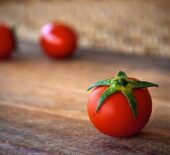Wholegrains are a food group rich in many different nutrients that support your health and wellbeing throughout life. This may include the time when you are trying to grow your family. Research suggests a link between higher wholegrain intake and a higher chance of implantation and live birth in women undergoing IVF treatment.
Researchers studied 273 women between the ages of 18-65 undergoing IVF treatment. A food frequency questionnaire was used to assess diet and the amount of wholegrains each woman was consuming both prior to beginning IVF treatment and during IVF treatment. The middle amount of wholegrains consumed by the women studied was 34.2 g/day which is approximately 1.2 servings/day of wholegrains.
Researchers found that those women who consumed more wholegrains prior to IVF treatment had a higher chance of successful implantation and live birth. Those women in the highest quartile of wholegrains in their diet consuming greater than 52.4 g/day had a 70% chance of success compared to 51% in those in the lowest quartile of wholegrains in their diet who consumed less than 21.4 g/day. For every wholegrain serve increase there was a 33% increase chance in successful implantation and 27% increased chance of a live birth. Another study supports this new research with recommendations of at least 4 servings of wholegrains to increase chances of pregnancy if undergoing IVF treatment.
The reason behind this is suggested to be the increased endometrial thickness which is a marker of increased receptibility. Nutrients found in wholegrains which may improve chances of a successful pregnancy include the anti-inflammatory properties found in wholegrains. Also, nutrients known to support optimal antioxidant defences in your body such as vitamin E, selenium, and phytic acid.
In addition, wholegrains have a lower glycaemic index compared to refined grains. This helps to support lower blood sugar levels and reduce insulin resistance. Thirdly, there are hormonally active compounds present in wholegrains such called lignans. These may support optimal oestrogen effects to increase the chances of a successful pregnancy and birth.
Wholegrains come in many forms, some examples include wholegrain rice which includes brown, red and black rice. Also, wholegrain pasta and couscous, quinoa, oats, and wholegrain crackers. Try adding a serve of two of wholegrains to each meal to reap the health benefits this food group can provide. An example could be one cup of cooked oats made on milk with sliced fruit and cinnamon at breakfast, a wholegrain sandwich 2 with sliced boiled egg, avocado and salad for lunch, and ½ cup of quinoa next to steamed vegetables and grilled salmon for dinner.
Take home message: Don’t be fooled into thinking all carbohydrates are bad. Wholegrains are a nutrient rich food group which support your health throughout your life. If you are trying to conceive using IVF, including adequate wholegrains may be a key factor helping grow your family.
References
- Gaskins AJ, Chiu YH, Williams PL, Keller MG, Toth TL, Hauser R, Chavarro JE; EARTH Study Team. Maternal whole grain intake and outcomes of in vitro fertilization. Fertil Steril. 2016 Jun;105(6):1503-1510.e4. doi: 10.1016/j.fertnstert.2016.02.015. Epub 2016 Feb 28. PMID: 26926253; PMCID: PMC4894002.
- Twigt JM, Bolhuis ME, Steegers EA, Hammiche F, van Inzen WG, Laven JS, et al. The preconception diet is associated with the chance of ongoing pregnancy in women undergoing IVF/ICSI treatment. Hum Reprod. 2012;27:2526–2531.
- Buyken AE, Goletzke J, Joslowski G, Felbick A, Cheng G, Herder C, et al. Association between carbohydrate quality and inflammatory markers: systematic review of observational and interventional studies. Am J Clin Nutr. 2014;99:813–833
- Blomhoff R. Dietary antioxidants and cardiovascular disease. Curr Opin Lipidol. 2005;16:47–54.
- Gutteridge JM, Halliwell B. Free radicals and antioxidants in the year 2000. A historical look to the future. Ann N Y Acad Sci. 2000;899:136–147.
- Liese AD, Roach AK, Sparks KC, Marquart L, D'Agostino RB, Jr, Mayer-Davis EJ. Whole-grain intake and insulin sensitivity: the Insulin Resistance Atherosclerosis Study. Am J Clin Nutr. 2003;78:965–971.
- Adlercreutz H. Lignans and human health. Crit Rev Clin Lab Sci. 2007;44:483–525.








